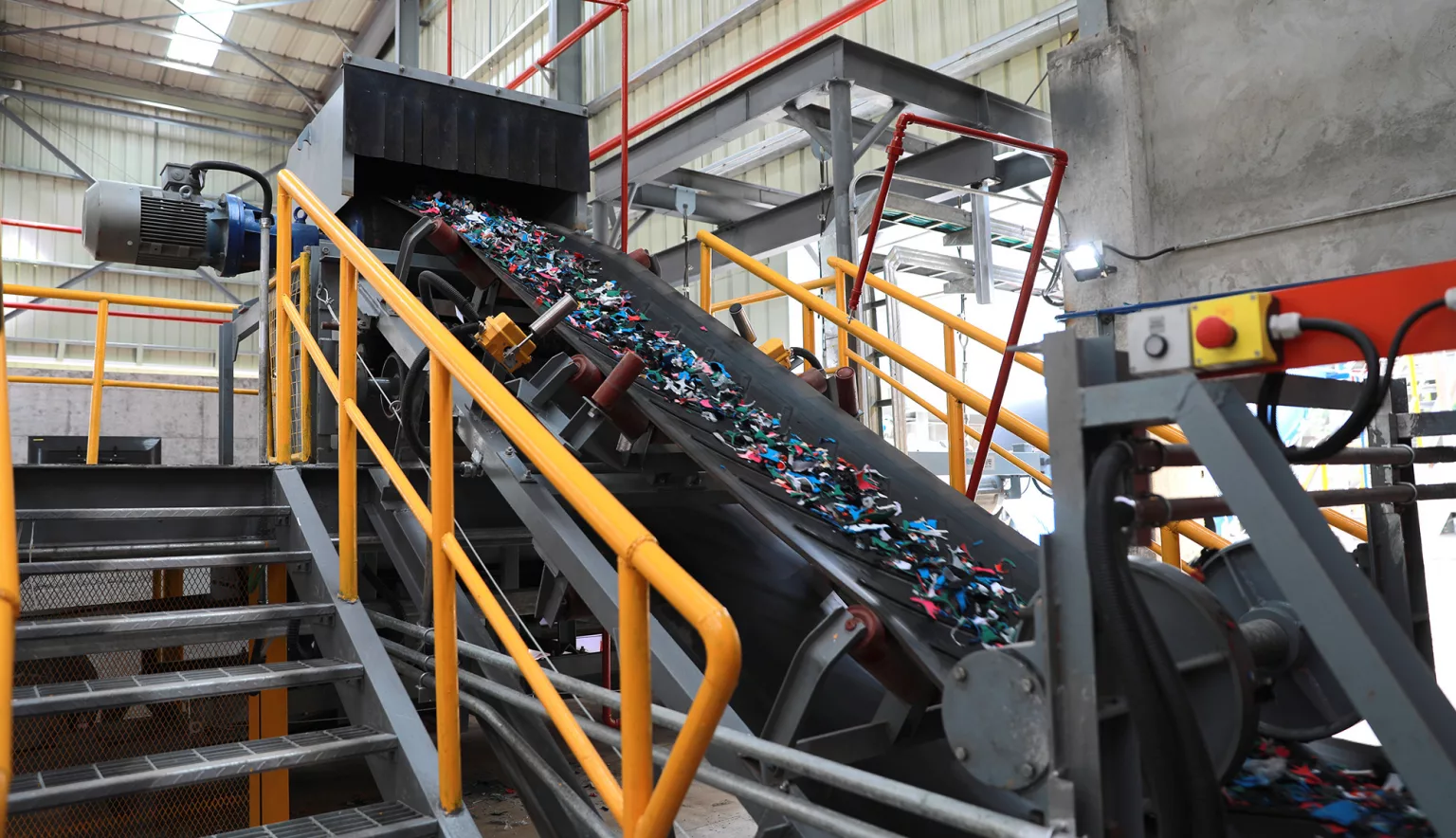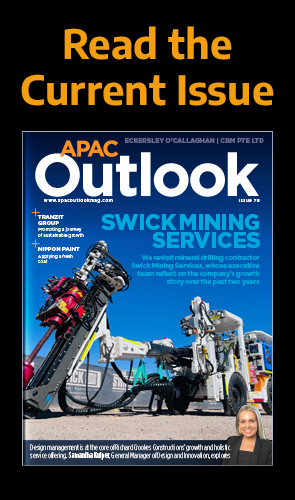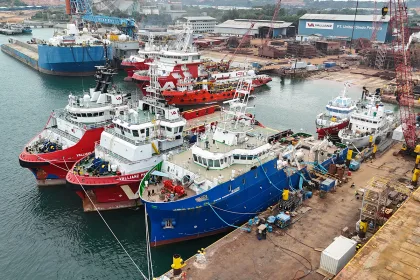Chip Mong INSEE Corporation brings a can-do attitude to Cambodian cement by assisting the country with quality products, community care and a local emphasis. Nicolas George, CEO, explains the motive behind this mandate.
A CAMBODIAN CHAMPION
Four decades ago, any mention of Cambodia would be met with a solemn response.
1980 lay bare the aftermath of the horrific Khmer Rouge regime that had ruthlessly attempted to rewind the clock and turn the country into an agrarian society. In brief, it had left Cambodia in a state of disrepair, brutally claiming the lives of two million people.
There is no question that scars from this period remain – the horror of those five years has been well documented as one of the greatest atrocities of the 20th century. Yet, gradually and admirably, the country has defied all odds, rising from the ashes to become a laudable emblem of Southeast Asian prosperity.
In the past 40 years, Cambodia’s GDP skyrocketed from $716 million to $22 billion. And the Organisation for Economic Cooperation and Development (OECD) has forecast that this is just the beginning, predicting that similarly monumental strides will continue throughout the next decade and propel Cambodia to upper middle-income status by 2030.
“Cambodia is thriving,” states Nicolas George, CEO of Chip Mong INSEE Cement Corporation (CMIC) – a company both capitalising on these economic tailwinds and epitomising the rapid national growth trajectory.
“The country is going through an unprecedented period of development that’s leading to a multitude of opportunities and attracting investors across various sectors. This creates a particularly dynamic environment with healthy competition, where any business looking to become a leader has to make a difference.”
CMIC itself has become a critical part of the construction ecosystem, viewed as being central to achieving these ambitious yet realistic aspirations.
Born from a joint venture between local company Chip Mong Group and Thai cement producer INSEE, the firm has leveraged the expertise of these two highly successful companies to become a market leader in Cambodia’s building materials industry.
“The current climate is ideal for our young company and team, providing them with plenty of opportunity to plant their footprint on Cambodia’s construction industry, challenge convention and let their imagination run wild,” George affirms.
PUTTING LOCAL PEOPLE FIRST
As the CEO’s comments suggest, workforce empowerment forms a core part of the culture of Chip Mong INSEE Corporation.
The company recognises its role as not just an employer but equally an educator, its structure built specifically to provide development opportunities across the board, benefitting everyone from its shop floor workers right through to the organisation’s leading executives.
“We strongly believe in giving our employees a sense of recognition and a purpose,” George states. “Fundamentally, it is crucial for local industry sustainability.
“We know that a cement business cannot sustain without proper skills being available locally. It does not make sense to operate a large industrial facility that largely employs foreign workers. Therefore, we have always made the development of the local workforce a top priority and established the necessary structures and processes to support that vision.”
The company’s apprenticeship programme stands as a prime example of this ethos in practice.
Here, CMIC selects 12 students from nearby communities every year, committing itself to train them as fully qualified technicians through a programme developed in partnership with the National Polytechnic institute of Cambodia.
“These students spend half their time in the classroom and the other half working in the field alongside our employees,” George reveals. “Upon completion of the programme, they receive a legitimately recognised formal diploma that can allow them to continue their studies to the next level if they so desire.”
Similar programmes are also offered to junior engineers, the organisation having hired a number of graduates as permanent in employees in 2019. And for existing employees, opportunities are likewise aplenty, CMIC ensuring channels for dialogue are maintained that staff members can use to request customised training in specific areas of personal interest.
“These are all ways in which we’re able to recognise and empower the great contributions of our team alongside our competitive salary offering and bonus scheme,” George adds.
STRIVING TOWARDS SUSTAINABILITY
The abundance of such initiatives is not to say that the company struggles with talent retention, however.
Chip Mong INSEE Corporation is a revered brand in Cambodia. And for good reason – its industry leading, state-of-the-art Touk Meas Plant has helped to characterise the company’s innovative presence alongside the legacies of its founding firms.
“The Touk Meas plant was designed with the most efficient technology available on the market. It has allowed us to pioneer the local cement industry by introducing application-based products that are more suitable for end users,” the Chief Exec comments.
“As an example, we recently began offering Camel Strong – a cement product featuring a better finish and improved workability that we developed six months ago following thorough market research to ensure our customers’ insights were properly considered and addressed.”
Located some 125 kilometres south west of Phnom Penh in the country’s Kampot Province, the facility spans 110 hectares and produces up to two million tonnes of cement per annum.
Yet it is not just its manufacturing might that is impressive. Likewise, the facility has been built and continues to be upgraded with a clear roadmap for improved environmental sustainability in mind, as is verified by its brand-new Ecocycle division launched in December 2019.
“Simply put, the objective of this new entity is to provide a fully integrated solution for the processing of industrial waste in Cambodia. It is also a key step in our overall CO2 reduction roadmap,” George reveals.
“The response from the market has been amazing. We already have many partners from which we collect waste, and we want to grow this activity rapidly, namely with a diversification in terms of the waste we can process as well as increasing our scope of service.
“Combined with the installation of a solar farm on the roof of our building and our water reservoir, we can proudly say that around 33 percent of our power is generated internally from renewable sources, solar and waste heat.”
RECOGNISING A WIDER RESPONSIBILITY
CMIC’s responsible attitudes do not end here, however.
Aside from its emphasis on employee empowerment and environment sustainability, the company partakes in a wider range of CSR initiatives overseen by a dedicated team that manages all stakeholder engagement activities.
“We have so many drives that it would take too long to go through them all,” the CEO muses.
“However, I can share some highlights: we run regular road safety campaigns in partnership with local authorities and NGOs, support local schools through the construction of latrines, finance science clubs, and have our apprenticeship programmes for select students.
“We also work to improve the livelihood of local communities with infrastructure development, irrigation systems, health campaigns, new income generation programmes, mason certification programs, and finally activities to increase environmental protection awareness and cleaning events that go hand in hand with our new waste management activity.”
Two years in the making, this extensive philanthropic remit has become a reflection of CMIC’s ethos that the firm can be proud of.
Indeed, its commitments have been duly recognised, most recently having received the 2019 CSR Award of EuroCham in Cambodia.
“Chip Mong is not only well respected because of the quality of its various services and products,” George comments. “It is also known for the positive impact that it has on the lives of local people, and we’re proud to carry that same spirit as we bear this same name, culture and values.”
Indeed, these attitudes will not waver moving forward.
In the eyes of the CEO, 2020 will see a large reduction in the number of imports from neighbouring countries across Cambodia, with local capacity having reached new heights during 2019, now able to fulfil local demand.
This will make CMIC’s local emphasis easier to maintain as it moves through the coming year. Yet such is not the only ambition of the company, George reiterating the firm’s aims in his coherent conclusion.
“We like to be simple and clear as we believe this is the best way to engage everyone across the company,” he begins.
“Therefore, our ambitions and priorities are very straight forward: we want to reinforce our leadership position in the cement business, we want to accelerate the development of our Ecocycle division to further reduce our environmental footprint, and we want to become the reference in term of people development.”




































